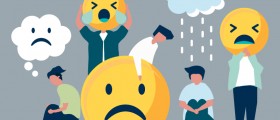What Does Thinking Error Mean?
When someone suffers for depression, he or she will change the way that person think and that will not happen consciously. The negative thoughts that depressed people have are affecting all aspects of their life, because they are changing their humor, perception and the way they act. One of the main things that need to be done is to detect these changes in order to do something about them and improve the thinking style. These thoughts can be very different, but they are always negative. For instance, they could be "I am always wrong" or " this will never come out right" and when people think this, they really believe this, and that can make them very depressed.
The question is what you can do to recognize these thoughts. There is a simple solution for this, and it involves writing down all the thoughts that you have on your mind, or that you had recently. It includes the thoughts that occur in one moment and then disappear, but come back again after a while. When you write down all these thoughts, you will be able to detect those ones that are leading you to depression. There are several criteria that can help you determine what thoughts are negatively affecting you.
Criteria for Recognizing Thinking Errors
Thoughts in the terms all or nothing without the possibility that something could be somewhere in between is one of the criteria that puts them in thinking errors. Also, if you catch yourself not to count your successes or to think that they happened only because of the luck you had, it means that you have thinking errors. Other criterion is to accept your emotions as facts, especially if they are related to negative anticipation. Thoughts that contain words, such as should, must and ought to belong to the group of thinking errors. Thinking that everybody's acts are done to provoke you or to upset you, means that you are taking things very personally and these are also thoughts that can lead you to depression. Generalizations that are too wide and distortion of events are other criteria for thinking errors.
- Cognitive distortions were first listed and described by Beck, Rush, Shaw, and Emery (1979). Burns (1980) subsequently expanded on their list and identified 10 common depressotypic thinking errors.
- These include mindreading (i.e., assuming that others are thinking negatively about oneself), catastrophizing (i.e., making negative predictions about the future based on little or no evidence), all-or-nothing-thinking (i.e., viewing something as either-or, without considering the full spectrum and range of possible evaluations), emotional reasoning (i.e., believing something to be true based on emotional responses rather than objective evidence), labeling (i.e., classifying oneself negatively after the occurrence of an adverse event), mental filtering (i.e., focusing on negative information and devaluing positive information), overgeneralization (i.e., assuming that the occurrence of one negative event means that additional bad things will happen), personalization (i.e., assuming that one is the cause of a negative event), should statements (i.e., thinking that things must or should be a certain way), and minimizing or disqualifying the positive (i.e., ignoring or dismissing positive things that have happened).
- Cognitive errors may occur with differing frequency across social and achievement domains, particularly depending on the content of an individual’s core beliefs, which typically fall into two categories: unlovability/sociotropy/dependency, or helplessness/autonomy/achievement.
- The purpose of the current study was to examine the relationships among cognitive distortions, adaptive and maladaptive humor styles, and depressive symptoms. Another objective was to evaluate whether humor styles mediate the relationship between cognitive distortions and dysphoria. As predicted, the frequency and impact of cognitive distortions, as well as frequency and impact ratings of cognitive distortions in both interpersonal and achievement-related contexts, were positively and significantly associated with depressive symptomatology.
- This finding is consistent with cognitive theory, which posits that cognitive distortions are a form of automatic thoughts related to negative affect and depressed mood. This finding is also supportive of the practice of assessing and altering cognitive distortions as a treatment target in cognitive behavioral therapy for depressed individuals.
- Consistent with hypotheses, cognitive distortions were inversely associated with beneficial styles of humor, and positively correlated with detrimental humor styles. Affiliative humor was significantly and negatively associated with all forms of cognitive distortions, with the exception of frequency of cognitive distortions in achievement situations, which was not associated with Affiliative humor. This is likely because achievement contexts are less relevant for efforts to affiliate with others. Affiliative humor is used to facilitate relationships and reduce tension, and involves a sense of playfulness and spontaneity. Negatively distorted thinking, in contrast, involves a rigid pattern of thinking that lacks the openness, flexibility, and creativity required to generate funny comments and anecdotes.
What Can These Thoughts Cause?
These thoughts are actually the reasons for numerous physiological changes in our body. If we have a thought that we acknowledge as a fact, then our body prepares for that fact and physiological reactions will occur. If you notice that you have these kinds of thoughts, you should confront them and try to change them into more functional thoughts or just neglect them and look at them as only thoughts without allowing them to change your behavior or mood.


















Your thoughts on this
Loading...